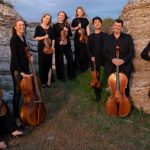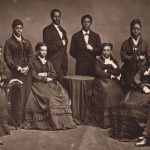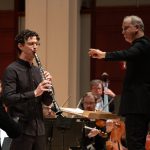July 31, 2021
Village Green Commons
Cashiers, North Carolina
Kate Ransom & Helen Kim, violins; Allison Bailey, violin & viola; Zuill Bailey, cello; Michael Kim & William Ransom, pianos.
HANDEL: Sonata in D major, HWV 371
J.S. BACH: Concerto for Two Violins (arr. Parnas)
KREISLER: Praeludium and Allegro
GERSHWIN:Three Preludes
DVOŘÁK: Piano Quintet in A major, Op. 81
Mark Gresham | 3 AUG 2021
The Highlands-Cashiers Chamber Music Festival has just completed its penultimate weekend of concerts for this year.
Two programs each performed twice between Friday and Monday is the Festival’s pattern: in Highlands on Friday and Sunday early evenings, and in Cashiers on the early evenings of Saturday and Monday. That makes it quite possible to drive the 135 mile, two-and-a-half to three hour trip from midtown Atlanta on a Saturday morning, and catch both programs, before returning late on Sunday night in time to go to work on Monday morning. Or if you’re retired, flexibly employed or just lucky, come back on Monday morning.
Saturday’s concert at The Village Green Commons in Cashiers was a familiar formula for HCCMF artistic director William Ransom, one of his “Sibling Rivalry”-themed concerts where he and violinist sister Kate Ransom perform with two other pairs of musical siblings. In this particular instance, violinist Helen Hwaya Kim and pianist Michael Kim, and violinist Alicia Bailey (in her HCCMF debut) and cellist Zuill Bailey.
This first half of the program, comprised of shorter works, served as the platform for showcasing each pair of siblings.
The Ransoms opened the concert with the Sonata in D major, HWV 371 by George Frideric Handel. It is the composer’s last piece of chamber music, despite false appearance to the contrary by the old designation Op. 1, No. 13, which was not Handel’s own, but given to it by Friedrich Chrysander in 1879, when it was included in a volume of sonatas for various instruments composed by or attributed to Handel. It’s a pleasantly attractive Baroque standard, in four movements, that runs about 12 minutes total.
Alison and Zuill Bailey followed with another popular Baroque work, J.S. Bach’s Concerto for Two Violins in D minor, BWV 1043, but in a contemporary chamber transcription by cellist Cicily Parnas, one half of another sibling duo, Duo Parnas, with her violinist sister, Madalyn Parnas Möller. Originally for two solo violins with Baroque string orchestra, this transcription keeps the essential gist of the music intact, although the interplay between soloists and orchestral forces that make it a “concerto” are absent. Instead, the interplay between two solo voices, of different rather than identical range, became the sole focus.
On an historical note about the original: History has left us manuscripts of only the two solo violin parts in Bach’s own hand. The orchestral score has survived in manuscript of copyists Samuel Hering and Johann Friedrich Hering – apparently siblings as well – with corrections by Carl Philipp Emanuel Bach.

Village Green Commons in Cashiers. North Carolina
The Kim siblings closed the first half of the program with two works: Praeludium and Allegro (in the style of Pugnani) by the great Austrian-born American violinist and composer, Fritz Kreisler, and George Gershwin’s Three Preludes arranged by another legendary violinist, Jascha Heifetz.
Kreisler’s composition was one of his many musical hoaxes. He would write a piece of music and ascribed to lesser-known composers of the 18th century, in this case Gaetano Pugnani. Kreisler finally admitted to the ruse in 1935, to the great annoyance of critics. First published in 1905, it is now, under Kreisler’s own name, a very popular piece of violin repertoire.
Jascha Heifetz was close friends with Gershwin, and his transcriptions of the Three Preludes which Gershwin wrote for piano solo, go beyond the originals in that Heifetz added his own touches to them, such as new counter-melodies. But Heifitz also was much more free in his performance, giving the pieces the feeling of a lot more swing and improvisation — which Ms. Kim also achieved in this instance.
After intermission came a consolidation of talents with the final work on the program, Dvořák’s Piano Quintet in A major, Op. 81. One of the goals was to involve all six performers in the performance of a piece, which in this case requires only five. The simplest part of the solution was having the two pianists share keyboard responsibilities. Will Ransom played the first and third movements while Michael Kim the second and final. Zuill Bailey, of course, played the cello part. But then what to do with three violinists? Helen Kim and Kate Ransom played the two violin parts of the quintet. Alison Bailey played viola. It’s not unheard of for a violinist to also play viola to some degree, but in this particular case the interesting part is that this particular performance of Dvořák’s Quintet was Bailey’s first public performance as a violist.
The Quintet was the highlight of what was overall a cheerful and satisfying concert, with only a few uneven moments here and there in the first half. Broadly speaking, the concert kept getting better as it progressed.
The subsequent “Concerto Night” concert in Highlands the very next day was a different affair, for which an account is soon forthcoming. Stay tuned.
The Festival concludes on August 8 with its Gershon/Cohn Final Gala Concert and Dinner Party. For more information: h-cmusicfestival.org ■
RECENT POSTS
 Tine Thing Helseth brings fire and finesse to trumpet concertos by Arutiunian, Penderecki, and Weinberg • 24 Oct 2025
Tine Thing Helseth brings fire and finesse to trumpet concertos by Arutiunian, Penderecki, and Weinberg • 24 Oct 2025 Camerata Nordica Octet brings Scandinavian color and classical clarity to Hodgson Hall • 21 Oct 2025
Camerata Nordica Octet brings Scandinavian color and classical clarity to Hodgson Hall • 21 Oct 2025




.png)